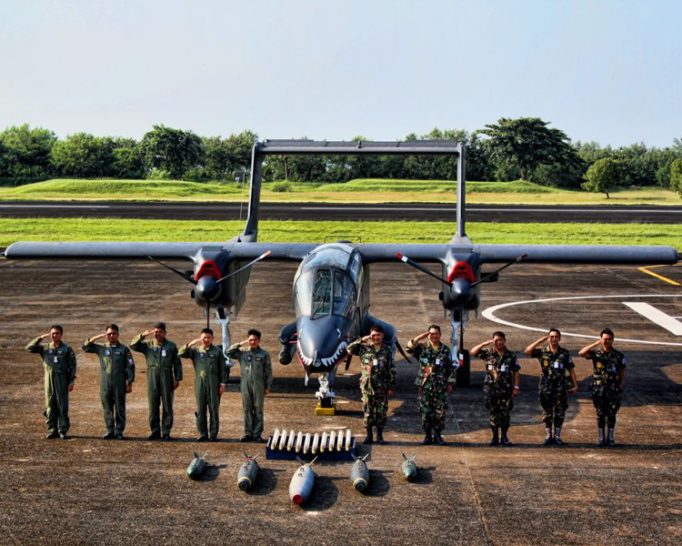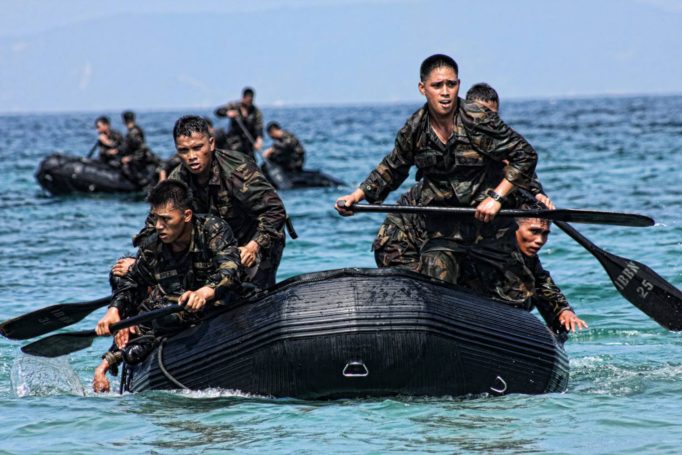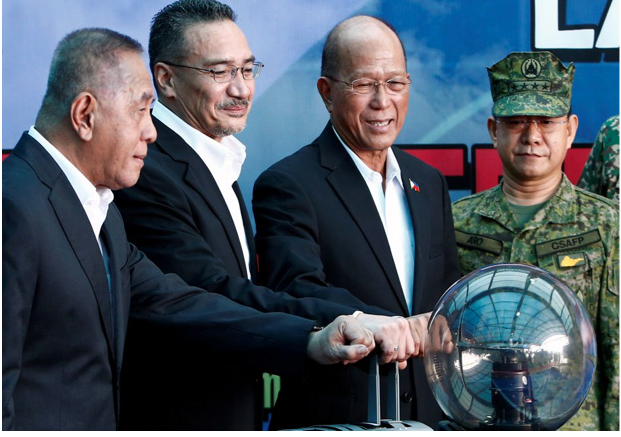The Philippines, being an archipelago, has no land borders with neighboring countries. Unlike some countries in Northern Africa like Morocco, Algeria, Tunisia, Libya, and Egypt, that have problems with porous borders between countries, the Philippines is spared of that kind of border problem. However, while these North African countries share the same stretch of coastline along the Mediterranean Sea, the length of their individual coastlines are more manageable to protect (Morocco 1835 kms; Algeria, 1000 kms; Tunisia 1148 kms; Libya, 1770 kms; and Egypt, 2000 kms) compared with the Philippines’ total coastline of 36,289 kms.
The Philippine Coast Guard had requested for an increase in procurement of Offshore Patrol Vessels (OPVs) to increase border security due to the increase in sea-based illegal activities such as drug smuggling, human trafficking, marine animal trade, poaching and intrusions into the Philippine Exclusive Economic Zone (EEZ), which is about 200 nm from the Philippine coastline shelf. Most of these illegal activities have been traced to mainland China, some to Taiwanese and Vietnamese fishermen, and to Islamic forces in the south of Mindanao. About 9 Chinese drug cartels called Triads have been involved in most illegal drug trade in the Philippines (R. Ramirez 2016). The U.S. Department of State found out that Chinese drug cartels are behind the trade of methamphetamine hydrochloride (crystal meth or Shabu) in the Philippines (P. Ranada 2016).
The border patrols that make use of fast OPVs are very adept at catching vessels loaded with smuggled goods entering our open waters, but the shipments keep continuing to enter our maritime borders and in an increasing number, as if to exasperate the border patrol agents.
Northern African countries – Morocco, Algeria, Tunisia, Libya, and Egypt – share very similar border security concerns as the Philippines. As part of their defense solution, they all invested in procuring OPVs and Frigates to help their navy and coast guard secure their borders. These countries would be good comparators when we try to analyze how the Philippines is doing in tackling exactly the same problems, and having generally the same type of vessels to counter illegal trafficking and terrorism.
Within the Bureau of Customs, there is the Enforcement Group that exercises policy authority at all ports, taking charge of customs border control, port security and communication, as well as inspection and monitoring of cargoes. Whenever massive smuggling has transpired within our marine ports or airports, it is because of rampant corruption in Customs, and what ensues after following the tracks of the smuggled goods is a homeland security problem later. The Bureaus of Customs, Immigration, and Investigation offices must be especially vigilant during these uncertain times when drug trafficking and movement of humans may take place using the front door of Customs and Immigration, rather than attempt to penetrate through porous holes in maritime borders in the rough open seas. Inter-agency support is therefore crucial.
Certainly, there is maritime white-collar thievery in the north, financed by foreign business smugglers and assisted by corrupt government personnel. And, there is sea borne terrorism in the south, perpetuated by homegrown and foreign-financed Islamic groups. The Illicit trafficking of goods that come with the lure of making a quick buck promotes more corruption, social disorder, and destabilizes the country with a bigger shadow economy, all of which rob the populace of resources that could have otherwise been used in rebuilding land infrastructure and schools, which are long-term investments that would provide a more stable standard of living in a more equitable economy.
Having secure borders is critical and essential to economic prosperity, national sovereignty, and homeland security. Border security is responsible for the control and examination of what enters and leaves a country. This is quite important due to current terrorist threats and organized crime infiltrating our country. We must protect our borders from the illegal movement of weapons, drugs, contraband goods, and people, while promoting lawful entry and exit.
In June 2017, Philippines, Malaysia and Indonesia signed a Trilateral Cooperation Arrangement to tighten border security with trilateral maritime patrol. The agreement aimed to halt crimes, including kidnapping, drug trafficking, and the transit of terrorists in the vast Sulu Sea. (Agence France Presse, 2017)
In October 2017, the National Security Council (NSC) and the National Coast Watch System (NCWS) had highlighted the importance of maritime and border security, and organized an ASEAN regional forum to discuss the 5 areas of focus:
- Inter-agency support within and between countries, and operational experience between military and government;
- Sustainability of fisheries – with a focus on combating illegal fishing activities and practices; and how to eliminate illegal unreported and unregulated fishing (IUUF);
- Confidence and capacity building measures – including infrastructure security, challenges and recent development plans, sea terrorism, best practices in joint responsibility efforts, and training;
- EEZ security – with reference to efforts in controlling piracy, counter-terrorism, military civilian inter-agency cooperation, developing shared maritime awareness; and
- Understanding that although there are challenges within the ASEAN Region, we must support a regional desire to expand partnerships to develop national capabilities for security, law enforcement, and border controls. (Marsecreview, 2017)
Following the success of the Trilateral Maritime Patrol inaugurated in June, the joint air patrol was the second component of the Trilateral Cooperative Arrangement (TCA) to secure the maritime areas of common concern among the Philippines, Indonesia and Malaysia. Also in October 2017, the three defense ministers of Malaysia, Indonesia and Philippines discussed the potential and importance of cooperation among neighboring nations. Malaysia, Indonesia and the Philippines began their coordinated Trilateral Air Patrols off the strife-torn southern Philippines to crush the mounting threat posed by Islamist militants. These 3 countries had already launched joint sea patrols four months back in June in the Sulu Sea. Fears had been rising because the Islamic State (IS) group was trying to establish a Southeast Asian outpost in southern Philippines, after gunmen waving the jihadists’ black flag occupied the Muslim City of Marawi in May. There had also been a rise in kidnappings in the Sulu Sea by the Abu Sayyaf, a Philippine Islamist militant group. A Malaysian defense spokesperson said the patrols were aimed at combating the threat from Daesh (IS), piracy and sea robberies. The countries took turns to lead the patrols, starting with Malaysia in November 2017, followed by the Philippines in December 2017, and Indonesia in January 2018. “The extensive nature of the effects inflicted by these threats has made it clear that it should not be addressed by one country alone. It requires regional cooperation among like-minded countries,” Defense Minister Hishammuddin Hussein said, adding that the joint maritime and air patrol operations of the three countries would be permanent and would continue for as long as needed. (Agence France Presse, 2017)
Indonesian authorities tightened security in areas bordering the Philippines, and at the Philippine mission in Jakarta following Manila’s declaration that its southern City of Marawi had been liberated from pro-Islamic State militants. Philippine President Rodrigo Duterte made the declaration that two commanders of the Islamic rebel alliance were killed. Marawi had been partly held by fighters linked to the Islamic State since the attack in May. Indonesia’s National Police Chief Gen. Tito Karnavian said that the deaths of Isnilon Hapilon and Omarkhayam Maute, as well as the liberation of Syria’s northern city of Raqqa from Islamic State militants by U.S.-backed Syrian forces, had taken a toll on the IS terrorist network. He warned, however, that the surviving militants would try to escape, with as many as 100 militants still at large in southern Philippines. He added that some Indonesians are among the jihadists in Syria and Marawi. “We need, therefore, to stay alert, working together with our intelligence counterparts, either those who have intelligence assets in Syria or in the Philippines to detect whether they are still there or have returned (to Indonesia). To anticipate their return by sea, military soldiers and police have been deployed to border areas. The Indonesian police have also been trying to determine the reaction of terrorist networks in Indonesia to the liberation of Marawi, and whether they will respond by deploying their members to Marawi or retaliate,” Gen. Tito Karnavian said. (Kyodo News, 2017

A report jointly prepared by the Financial Transaction Reports and Analysis Center, the National Counterterrorism Agency, and the State Intelligence Unit, which mapped the risk of Terrorism-Financing finds that online donations from sympathizers and supporters are hard to trace because of the ease to open social media accounts using fake identities. It reports that donations via nonprofit organizations, and funds obtained from illegal activities used to be rated as high risk, meaning there is a high chance of occurrence, but are now rated medium-risk. However, the report states that in recent years, terrorism-related funding had been mainly moved through remittance and banking transactions than by cash. It cites the inbound transfer of funds from Australia, Hong Kong and Malaysia to finance terrorism activities in Indonesia, and the outgoing wire transfers to buy weapons from the Philippines. And as a result of tighter monitoring of cross-border movements of people in recent years, there has been a decline in the incidence of terrorist suspects found at the border carrying cash, thus, cash movements are now considered low-risk. (Kyodo News, 2017)
In November 2017, the then head of the Armed Forces of the Philippines (AFP), Gen. Rey Leonardo B Guerrero, urged members of the ASEAN to fortify their border security in order to curb transnational crime and prevent the entry of terrorists. Gen. Guerrero stressed the need to enhance regional border security through coordinated border patrols. (Reyes, 2017)
Gen. Guerrero said the AFP would be banking on a national policy and defense agenda to develop a “credible defense force” by strengthening the country’s Naval and Air capabilities. He said this would result in a “more effective” monitoring and control of sea lanes and air space within the region. “For this, we will reinforce our Maritime Domain awareness on our maritime areas of interest particularly our Sea Lanes of Communications (SLOCs). We will also push through with our capability build-up in order to enhance our maritime operations capability,” Gen. Guerrero explained. (Reyes, 2017)
Given the possibility that lawless elements may use the country’s common maritime borders for illegal activities, there is no other option for the Philippines but to work with its neighbors to strengthen their regional border security. The Philippines and other member-countries of ASEAN ought to work in unison to combat transnational crimes, like piracy and hijacking. (Journal.com, 2017)
The new head of the Armed Forces of the Philippines, Gen. Carlito Galvez, was appointed in April 2018. He has been very active in the implementation of the AFP modernization program so as not to hamper ongoing and future military operations, and holding peace talks with the MILF group. His efforts are focused on ensuring successful implementation of various peace mechanisms. In particular, the AFP is jointly planning and organizing the Joint Peace and Security Teams (JPST) with the Philippine National Police (PNP) and the Moro Islamic Liberation Front (MILF).
In May 2018, after 12 days of training, approximately 8,000 service members from the U.S. military and Armed Forces of the Philippines (AFP) completed the Exercise Balikatan, resulting in increased inter-operability and improved military skills. Through Balikatan, the forces built upon a long and productive history of joint military exercises that enhance interoperability, strengthen partnerships, and improve disaster response and counterterrorism capabilities. (U.S. Embassy, 2018)
This is the 34th Balikatan, which focused on counterterrorism, humanitarian assistance and disaster relief, as well as combined military operations to ensure a more rapid response to natural disasters and manmade crises in the region. The combined U.S.-AFP military forces conducted a diverse range of training events, such as a combined arms live-fire exercise, an amphibious raid, close air support operations, artillery training, search and rescue operations, and small unit tactics operations. These training events strengthen the U.S.-AFP military partnership and will provide a more effective combined joint response for future operations.
In June 2018, the AFP had been able to train 14 teams of JPSTs that have been deployed to Central and Western Mindanao. Each JPST is composed of 7 AFP officers, 8 PNP officers, and 15 from MILF. This number is expected to continually increase as the Bangsamoro normalization process progresses. (AFP News, July 2018)
In the past couple of years, defense and security needs have become increasingly important based on the escalating tensions in the South China Sea between Claimant Countries and China. Centering on the Freedom of Navigation issue, it is imperative to strengthen protocols that can prevent unintended incidents. There are also perennial issues of seaborne terrorism in Sulu Sea, southwest of the country, including drug trafficking of Shabu within southern Philippine EEZ waters.
In June 2018, the PNP found 24 kilos of Shabu worth over Php163 million sold as refined Chinese tea in packets that are made in Caloocan. (Andrade, 2018)
In July 2018, the PNP Director General Renato “Bato” de la Rosa declared there are no longer any Shabu manufactured in the Philippines. He said they now enter from abroad through normal procedures of the Bureau of Customs. A suspect was arrested by the Philippine Drug Enforcement Agency (PDEA) with P47 million worth of Shabu in San Andres Bukid, Manila, with its mastermind running the operation from inside jail using a cell phone. Another arrest by a joint effort of PDEA, PNP (SAF), and PA (7th Infantry Battalion) of a Barangay Captain and his wife distributing Shabu packets worth P340 million in North Cotabato. A departing 61 year old Korean was also arrested by PDEA and PNP (AVSEGROUP) with P54,400 worth of Shabu in Clark International Airport, Pampanga. (PDEA News, 2018)
It is important that we protect our maritime borders not only from illegal trafficking of drugs but also from the “mules” sent by organized crime to distribute Shabu inside our borders. Once they have penetrated our borders through the porous door of the open seas or the front door of the Bureau of Customs, it becomes easier for them to package and distribute, and in turn, harder for law enforcement agents to mitigate the spread of illegal drugs, particularly Cocaine and Shabu. The idea of our border security being a maritime concern would be more successful with coordinated foreign regional maritime border patrols and air patrols, as well as local inter-agency coordination.
Main References:
- Ranada, Pia (January 5, 2016). “A look at the state of crime, drugs in the Philippines.” Rappler.
- Ramirez, Robertzon (November 27, 2016). “Chinese gangs behind Philippine illegal drug trade.” The Philippine Star.
- Lai Sen Sin (October 13, 2017). “Philippines to conduct air patrols with Malaysia, Indonesia.” ABS-CBN News. Agence France Presse.
- NSC Office of the President and NCWC (October 17, 2017). Maritime and Border Security Philippines. Marsecreview.com
- Kyodo News (October 18, 2017). “Terror funding shifts in Indonesia: government report.” ABS-CBN News.
- Kyodo News (October 21, 2017). “Indonesia tightens border security following Marawi liberation declaration.” ABS-CBN News.
- Reyes, Dempsey (November 6, 2017). “Philippines urges tighter Asean border control.” Manila Times.
- Peoples Tonight (November 7, 2017). Border security. Journal.com
- U.S. Embassy (May 18, 2018). “Balikatan 34 Strengthens U.S.-Philippine Alliance through Rigorous Training.”
- Andrade, Jeannette (June 14, 2018). “PNP chief: Looks like P163-M ‘shabu’ came from China.” Inquirer.
- AFP News (July, 2018).
- PDEA News (July, 2018).
